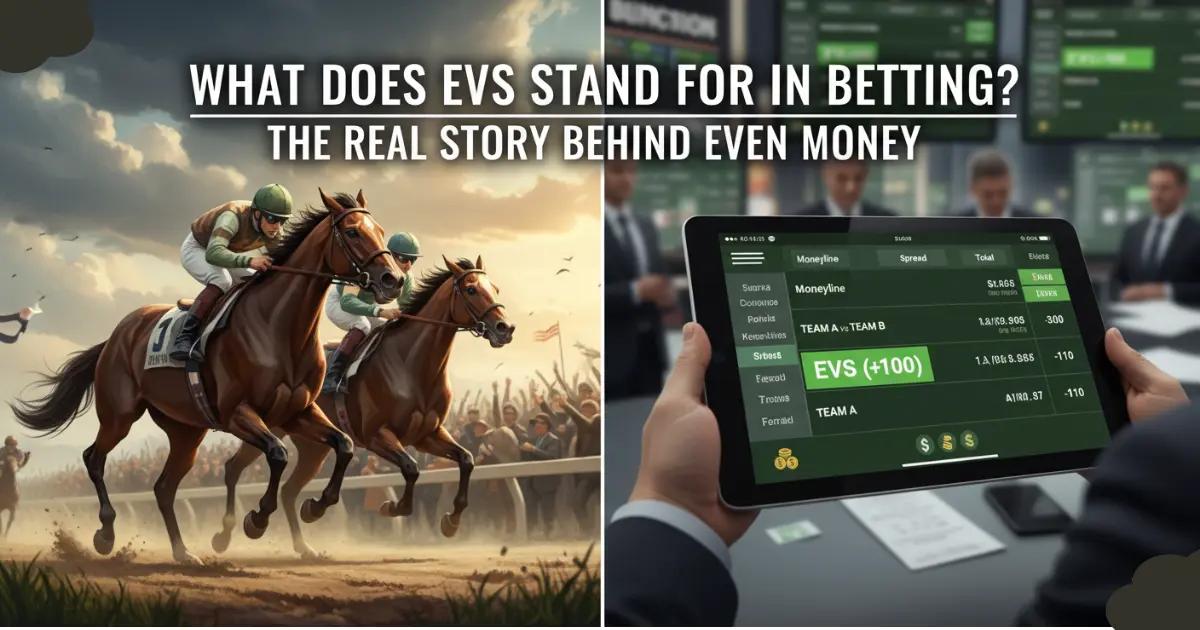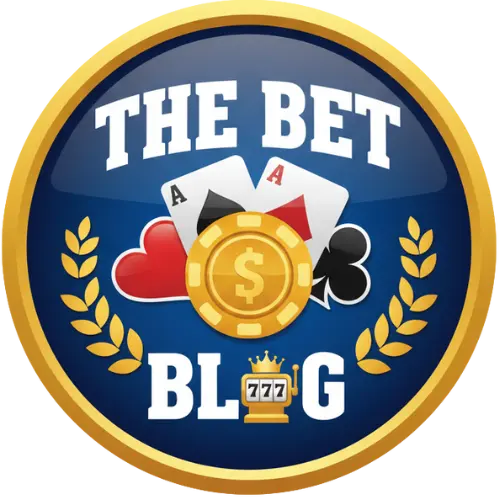
🎯 Key Takeaways
- ✓ EVS stands for 'evens' in betting - offering 1/1 odds that double your stake when you win
- ✓ Even money bets give you a 50% implied probability with balanced risk-reward ratios
- ✓ Smart bettors use EVS odds for bankroll management and consistent profit strategies
Introduction
What does EVS stand for betting?
It's one of those questions that pops up constantly in betting forums, and honestly, I get it.
You're scrolling through odds, everything's making sense, then suddenly you see "EVS" staring back at you.
Is it some complex betting system?
Some insider term that only the pros understand?
Nah, mate.
After more than a decade in the betting game, I can tell you EVS is actually the simplest concept you'll encounter.
But here's the thing - simple doesn't mean unimportant.
Understanding what EVS stands for in betting isn't just about decoding three letters.
It's about grasping one of the most fundamental concepts that can make or break your betting strategy.
What Does EVS Actually Stand For?
Let me cut straight to it.
EVS stands for "evens" in betting.
That's it.
No fancy algorithm, no complicated maths.
When you see EVS on a betting slip, you're looking at even money odds.
In practical terms, this means 1/1 in fractional odds or 2.00 in decimal format.
Think of it like this - you stake £10, you win £10 profit.
Your total return is £20 (your tenner back plus another tenner in winnings).
The evs meaning betting world revolves around this 50/50 proposition.
It's the bookmaker's way of saying "we think this outcome has roughly the same chance of happening as not happening."
Understanding EVS Odds in Different Formats
Here's where things get interesting for punters who jump between different betting platforms.
Fractional Odds: EVS appears as 1/1
- Stake £20, win £20 profit
- Total return: £40
Decimal Odds: EVS shows as 2.00
- Same maths, different presentation
- Multiply your stake by 2.00 for total return
American Odds: EVS displays as +100
- Less common in the UK, but worth knowing
- Plus 100 means you win $100 for every $100 staked
The beauty of EVS is its simplicity across all formats.
Whether you're used to fractional or decimal odds, even money is even money.
No conversion charts needed, no calculator required.
Why EVS Betting Appeals to Smart Punters
I've watched countless bettors over the years, and there's a pattern with those who last.
They understand the value of EVS betting.
Balanced Risk-Reward: You're not chasing massive payouts that rarely come off. You're not settling for tiny returns that barely cover a coffee. EVS sits in that sweet spot.
Predictable Bankroll Management: When every winning bet doubles your stake, planning becomes straightforward. No complex calculations about how much you'll win. Perfect for systematic staking approaches.
Lower Variance: High-odds bets create wild swings in your bankroll. Favourites at 1/5 barely move the needle when they win. EVS provides steady, manageable progression.
I've seen too many punters blown out chasing 10/1 shots or grinding away at odds-on favourites.
EVS offers a middle path that actually makes sense.
Common EVS Betting Markets You'll Encounter
Football Match Betting: Two evenly matched teams, neutral venue. Think Manchester City vs Arsenal in a cup final. The bookies can't separate them, so both teams get EVS.
Tennis Match Winner: Similar-ranked players facing off. Murray vs Djokovic in their prime - proper 50/50 affairs.
Horse Racing: Two horses with identical form competing. Rare, but when it happens, EVS reflects genuine uncertainty.
Over/Under Markets: Total goals, corners, cards. When bookmakers genuinely can't call which side of the line.
Both Teams to Score: In matches where defences and attacks are evenly balanced.
The key is recognising when EVS truly reflects the underlying probability.
Sometimes bookmakers get it wrong, and that's where value appears.
EVS vs Other Betting Odds - What's the Difference?
Let me break this down with real examples.
EVS (1/1) vs Odds-On Favourites (1/2, 4/9):
- EVS: Higher payout, higher risk
- Odds-on: Lower payout, supposedly safer
- Reality: Neither is automatically better value
EVS vs Long Shots (5/1, 10/1):
- Long shots offer bigger payouts but lower win probability
- EVS provides consistent returns with moderate risk
- Long-term profitability often favours disciplined EVS betting
EVS vs Handicap Betting:
- Handicaps create artificial even money markets
- Pure EVS reflects genuine market uncertainty
- Both have their place in a balanced strategy
The mistake I see constantly is punters thinking longer odds automatically mean better value.
Value comes from finding odds that underestimate true probability.
Sometimes that's a 5/1 shot, sometimes it's an EVS bet the market has wrong.
Smart Strategies for EVS Betting
The Value Hunter Approach: Don't bet EVS just because it's even money. Look for situations where you believe the true probability exceeds 50%. If you think a team has a 60% chance but gets EVS, that's value.
Bankroll Building: Use EVS bets to steadily grow your betting bank. Less exciting than chasing big odds, but more sustainable. Perfect for rebuilding after a bad run.
Hedge Betting: EVS markets work brilliantly for hedging positions. Especially useful in live betting scenarios.
System Betting: Some progressive staking systems work specifically with even money bets. Martingale systems (use with extreme caution) require EVS or better.
Remember - no betting system overcomes negative expected value.
Find value first, then apply your staking strategy.
If you're interested in systematic approaches, check out our Kelly Criterion Calculator for optimal staking on EVS bets based on your edge.
Common Mistakes to Avoid with EVS Betting
Assuming EVS Means Fair Odds: Bookmaker margins still apply. True EVS might actually be 10/11 after the bookie takes their cut. Always shop around for the best available odds.
Ignoring the Underlying Event: Just because odds are even doesn't mean both outcomes are equally likely. Do your research, form your own opinion. The market can be wrong.
Overbetting Because "It's Only Even Money": EVS bets still lose 50% of the time (roughly). Proper bankroll management remains crucial. Don't let the simplicity fool you into reckless staking.
Chasing Losses with EVS: Even money feels safe, but it isn't guaranteed money. Doubling up after losses can destroy your bank quickly. Stick to your predetermined staking plan.
Finding Value in EVS Markets
Here's where experience really matters.
I've learned to spot EVS value by focusing on these areas:
Market Overreactions: Team news breaks, odds shift dramatically. Sometimes EVS appears when the market has overcompensated.
Head-to-Head Records: Historical data the market might be overlooking. Some matchups consistently favour one side despite even odds.
Situational Factors: Motivation levels, rest periods, travel schedules. Elements that don't always reflect in basic form analysis.
Live Betting Opportunities: In-play EVS can offer incredible value. Especially when early events skew perception.
The goal isn't to bet every EVS market you see.
It's to identify the ones where your analysis suggests better than 50% probability.
EVS Betting and Responsible Gambling
Let me be straight about something important.
Even money doesn't mean safe money.
You can still lose your shirt betting EVS if you're not careful.
Set Clear Limits: Decide your maximum stake before you start. Don't chase losses with bigger bets. Walk away when you hit your stop-loss.
Track Your Results: Keep records of all EVS bets. Look for patterns in your wins and losses. Honest self-assessment beats wishful thinking.
Understand the Risks: 50% win rate means 50% loss rate. Variance can create long losing streaks. Only bet money you can afford to lose.
Seek Help if Needed: If betting stops being fun, get support. GamCare: 0808 8020 133 Gamblers Anonymous: National helpline available
Betting should enhance your enjoyment of sport, not create financial stress.
Conclusion
Understanding what EVS stands for in betting opens up a world of strategic opportunities.
It's not just about knowing that EVS means evens - it's about recognising when even money represents genuine value.
Smart punters use EVS betting as part of a balanced approach.
Not the only tool in the box, but an important one when deployed correctly.
The best part about EVS betting is its transparency.
No complex calculations, no hidden variables.
Just you, your analysis, and a straight 50/50 proposition.
Master the art of finding value at even money, and you'll have what does EVS stand for betting sorted for good.
